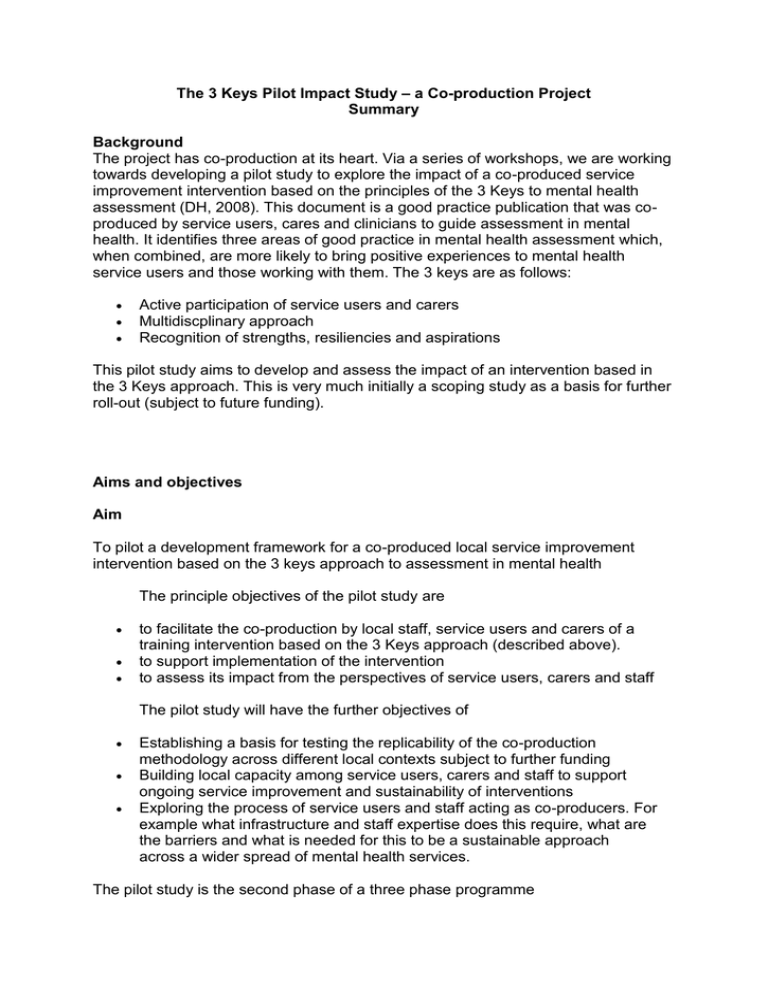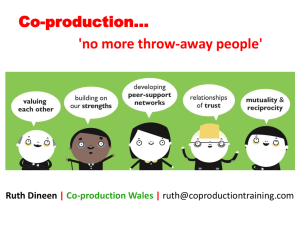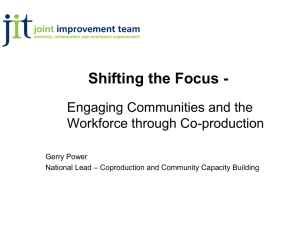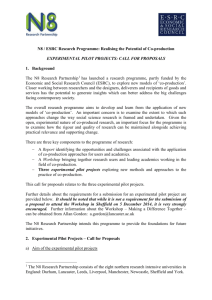– a Co-production Project The 3 Keys Pilot Impact Study Summary Background
advertisement

The 3 Keys Pilot Impact Study – a Co-production Project Summary Background The project has co-production at its heart. Via a series of workshops, we are working towards developing a pilot study to explore the impact of a co-produced service improvement intervention based on the principles of the 3 Keys to mental health assessment (DH, 2008). This document is a good practice publication that was coproduced by service users, cares and clinicians to guide assessment in mental health. It identifies three areas of good practice in mental health assessment which, when combined, are more likely to bring positive experiences to mental health service users and those working with them. The 3 keys are as follows: Active participation of service users and carers Multidiscplinary approach Recognition of strengths, resiliencies and aspirations This pilot study aims to develop and assess the impact of an intervention based in the 3 Keys approach. This is very much initially a scoping study as a basis for further roll-out (subject to future funding). Aims and objectives Aim To pilot a development framework for a co-produced local service improvement intervention based on the 3 keys approach to assessment in mental health The principle objectives of the pilot study are to facilitate the co-production by local staff, service users and carers of a training intervention based on the 3 Keys approach (described above). to support implementation of the intervention to assess its impact from the perspectives of service users, carers and staff The pilot study will have the further objectives of Establishing a basis for testing the replicability of the co-production methodology across different local contexts subject to further funding Building local capacity among service users, carers and staff to support ongoing service improvement and sustainability of interventions Exploring the process of service users and staff acting as co-producers. For example what infrastructure and staff expertise does this require, what are the barriers and what is needed for this to be a sustainable approach across a wider spread of mental health services. The pilot study is the second phase of a three phase programme Phase 1 – local modelling Phase 2 –pilot study Phase 3 – future development Further details of the three phases and how they fit together are summarised in the Figure below. The pilot study itself (phase 2) is subdivided into four stages, 1) baseline data collection and community engagement, 2) co-production through the 3 keys framework of a service improvement intervention, 3) implementation of the intervention (including data collection), 4) evaluation and analysis (see below) Progress to date Initial planning and design meetings began in December 2011 and we have now completed a number of co-production workshops. These produced a number of proposals for an intervention that have been explored further using focus groups. The focus groups suggested that developing processes of peer support might be an appropriate intervention. However logistically this might go beyond our available resource. Currently we are looking at ways of exploring this and ossible alternative interventions further The team Work has been co-ordinated and managed via a core team consisting of practitioners, service users and academics. Core Organising team Lu Duhig – carer and 3 Keys Bill Fulford – values-based practice and 3 Keys Julie Hankin - psychiatrist and (at the time) service improvement lead Joanna Hicks – co-production Justine Keeble – service user researcher Martin Hember – EI team member Nicky Kehoe – EI team member Service users A group of 7 service users have been regularly attending and contributing to the project. Service providers Owing to restructuring within AWP, gaining on-going input from a specified team at AWP has been a challenge. But we now have a well-established relationship with the EI (Early Intervention) team in Bristol Funding The project was initially funded by the Department of Health via the University of Central Lancashire. In order to continue the project, funding has been gained from the Laces Trust. 4 facilitated Co-production workshops over a 3 month period 1.Prequel – introduction to co-production and group forming 2.Initiation – agreement on desired intervention, actions for implementation and outcome measures 3.Review – monitor progress against plan 4. Final review and assess outcome Baseline data collection and community engagement Phase 3 – future development - would need to seek further funding based on phase 2 Possible full stepped wedge trial across remaining teams Qualitative evaluation of process and analysis Phase 1 – local modelling – Defining the intervention Initial 2 staff workshops (complete) SU and carer workshop and co-development workshop Formation of collaborative core research group with service user forum representative and carer representative Pilot study




